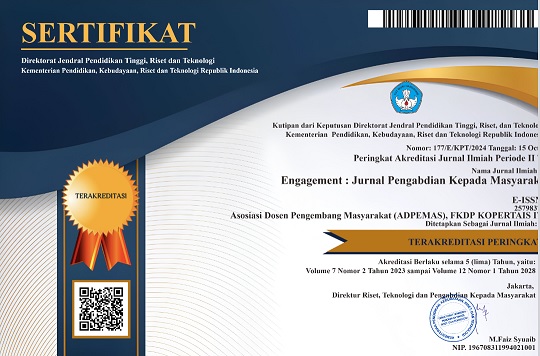Assistance of Natural Handmade Soap Production to Darul Ibadah Community Bangkok for saving Environment and Financial Issue
Abstract
Consumption of skincare products is potential causing environmental and personal financial problems. Most of the skincare products are packaged in plastic materials and contain hazardous chemicals. Besides, the price of high-quality skincare is generally expensive, and some people may not be able to afford it. The world community must be aware that their self-care should not impact big problems. This program aims to assist the community in producing natural handmade soap as one of a skincare series in various regions, and for this time, the main partner of this program is the Darul Ibadah community in Phutthabucha , Thung Khru District, Bangkok. This activity was carried out as part of a collaborative agreement between the Faculty of Economics, Sultan Agung Islamic University and Kasetsart University. This assistance is expected to be an effort to save the community by creating their own qualified products, reducing waste and water pollution from chemical-based soaps
Downloads
References
Bayu Pinandoyo, Dimas, Asriadi Masnar, and Supardianningsih Supardianningsih. “Food Packaging Rebranding Assistance for Vegetable Products of OkeFarm Neglasari Women Farmer Group.” Engagement: Jurnal Pengabdian Kepada Masyarakat 6, no. 1 (2022): 173–186.
Bilgies, Ana Fitriyatul, Dya Viani Subastian, Diah Ayu, Retno Palupi, Emilia Firsa, and F Vicky. “Peran Kualitas Produk, Harga Dan Kualitas Layanan Terhadap Kepuasan Pelanggan Billagio Skincare Clinic Sidoarjo.” Ekonika : Jurnal ekonomi universitas kadiri 1, no. 1 (2021): 78–90.
Chirani, Mahboobeh Rafieepoor, Elaheh Kowsari, Targol Teymourian, and Seeram Ramakrishna. “Environmental Impact of Increased Soap Consumption during COVID-19 Pandemic: Biodegradable Soap Production and Sustainable Packaging.” Science of the Total Environment 796 (2021).
Chotimah, Chusnul. “Pengembangan Sekolah Berbasis Go Green Dan Waste Management Untuk Mewujudkan Green School Di SDI Miftahul Huda Plosokandang Kabupaten Tulungagung.” Engagement : Jurnal Pengabdian Kepada Masyarakat 3, no. 2 (2019): 143–160.
Farida, Yuniar, Wika Dianita Utami, Aris Fanani, Latifatun Nadya Desinaini, and Silvia Kartika Sari. “Economic Empowerment of Housewives Based on OPOR (One Product in One RT) in Pojok Village of Magetan Regency, Using the Asset-Based Community-Driven Development (ABCD) Approach.” Engagement: Jurnal Pengabdian Kepada Masyarakat 6, no. 1 (2022): 17–41.
Friedman, M. “Chemistry, Formulation, and Performance of Syndet and Combo Bars. Soap Manufacturing Technology.” In In Soap Manufacturing Technology, 73–106. AOCS Press, 2016.
Geisler, Ramsia, Martin Cramer Pedersen, Natalie Preisig, Yvonne Hannappel, Sylvain Prévost, Rajeev Dattani, Lise Arleth, and Thomas Hellweg. “Aescin - a Natural Soap for the Formation of Lipid Nanodiscs with Tunable Size.” Soft Matter 17, no. 7 (2021): 1888–1900.
Gyedu-Akoto, Esther, Daniel Yabani, John Sefa, and Dominic Owusu. “Natural Skin-Care Products: The Case of Soap Made from Cocoa Pod Husk Potash.” Advances in Research 4, no. 6 (2015): 365–370.
Ibadah, Dokumen Profil Komunitas Darul. “เอกสารประกอบการประกวดวสช.ดารุ้ลอิบาดะห์(1). Pdf,” n.d.
Kusumawardhani, Ratih, Ignatius Soni Kurniawan, Alfiatul Maulida, and Agus Dwi Cahya. “Pelatihan UKM Rumahan Industri Pangan Sebagai Upaya Meminimalkan Kendala Berwirausaha.” Jurnal Pengabdian kepada Masyarakat (Indonesian Journal of Community Engagement) 6, no. 1 (2020): 23.
Maotsela, T., G. Danha, and E. Muzenda. “Utilization Ofwaste Cooking Oil and Tallow for Production of Toilet ‘Bath’ Soap.” In Procedia Manufacturing, 541–545, 2019.
Nurmayanti, Ida, and Hermanto. “Strategi Yayasan Mangrove Center Tuban Dalam Mengembangkan Ecological Citizenship Pada Masyarakat Tuban.” Jurnal Kajian Moral Dan Kewarganegaraan 5, no. 2 (2017): 83–97.
Subastian, Dya Viani, Diah Ayu, Retno Palupi, Emilia Firsa, and F Vicky. “Celebrity Endorser Raffi Ahmad Terhadap” 2, no. 1 (2021): 1–10.
Copyright (c) 2023 Engagement: Jurnal Pengabdian Kepada Masyarakat

This work is licensed under a Creative Commons Attribution-ShareAlike 4.0 International License.






.png)




